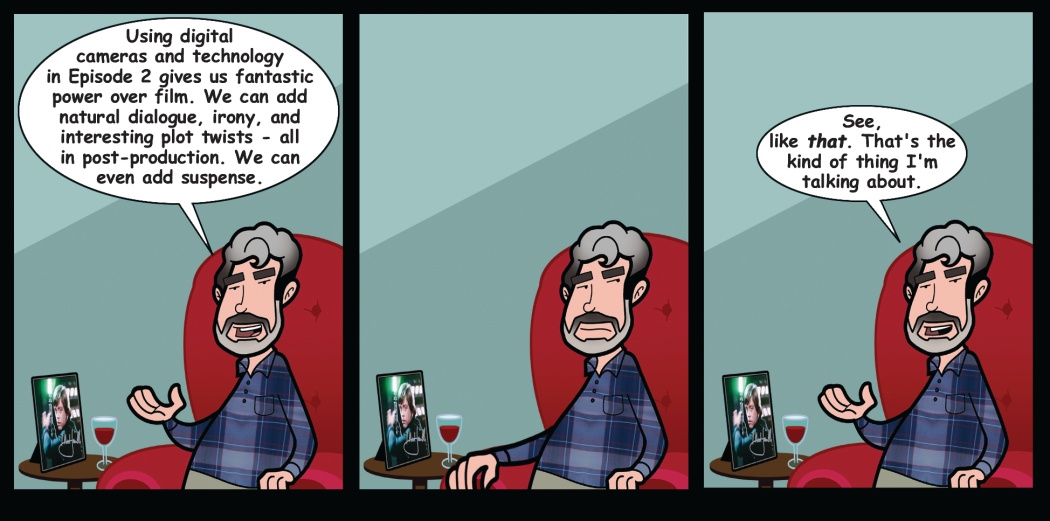I've been asked to speak at local lit-con Readiation, whose dangerous-sounding name belies a friendly, relatively tame event. At no point is a Geiger Counter required, unless it is used exclusively as an accessory for a futuristic costume. It caters to what you might call the "hardcore reader," a population scientists would study with intensity if they knew it existed. Dog-eared copies from Steven Brust's Taltos Cycle or signed offerings from Lois McMaster Bujold circulate like holy relics. Aficionados of the event - though they prefer to be called afictionados - suggest that the annual affair represents the true "Home Of The Tome," and I am inclined to believe them. I visited the event last year as part of my "Elemenstation Of The West" signing tour, and before I met these people I was under the impression that I liked books quite a lot.
In any case, I'm on a couple writing workshops. There's supposed to be another guest speaker, but whenever I ask who it is, people always remember something important that they have to do right at that moment.
I was surprised to hear from so many people that they felt that Microsoft had "won" E3, even people for whom consoles must universally emerge from the mysterious east. The Wii made a splash, to be sure - everyone had to have that conversation at least once - but as what John Tynes might call a "mutation," it's difficult to compare it straight across with machines so divergent from it philosophically. Also, Nintendo's booth was simply incapable of delivering a satisfying experience because raw, surging demand for that experience was at a level I've never seen in six years of attending the show. The final score might have been different had everyone been playing the same game.
In reality, Microsoft's "win" is a composite of several factors, not the least of which is the haughty and ridiculous performance of their primary competitor. We don't need to go into it; after two days of clear language on the subject I believe my position has been made plain. But the advantage of a head start for developers on the system can't be overemphasized.
My friend Jason wrote me to mention that Mass Effect was his game of show, even over Gears, and I think I wrote back to tell him that I couldn't call something game of show if I hadn't played it myself. He's not wrong to say that the demo was impressive, however - what Microsoft has done is secure the sweet affections of Western developers known for powerful narratives, and turned them loose on the thing. With Bioware and Silicon Knights hard at work, it really seems like a game from Obsidian Entertainment would make it a set. Give them Shadowrun or Mechwarrior, or Shadowrun and Mechwarrior. But let's continue.
People kept comparing it to Star Control II, which to me is serious is a serious matter and I demanded that they stop doing it. I understood what they mean, once I saw it - a large galactic map, with a customizable rover type vehicle you can scour the surfaces of worlds with. That's basically where it stops. The rest of it... Well, let's talk about the rest of it.
Remember how in KOTOR, the camera would show their face, and then it would show your face, and then it would show their face, and there were about five faces total for the entire universe? We put up with it because it was Star Wars, and it was well-written, but visually there was nothing going on there. That's completely over. Imagine if the conversations you entered into were each expressed with a kind of "directorial vision," where camera angles themselves communicated drama and gravity! I know, it's crazy, but they're doing it. When you couple that with vastly improved faces that deliver on extraordinary emotional subtleties, subtleties that are clear even for non-human races(!) - nervous eye movement, a moment's furrow of the brow - and we are moving into another era. They have moved away from the old "here are all your lines of dialogue" system, which worked fine but wasn't terribly immediate, and instead moved to a circular interface where you choose the basic form of your response. Things like threats or coaxing all occupy sort of set positions around this wheel, so you start to build a kind of intuition about the interface. One more thing - these basic options come up a little before the other person's dialogue has finished, so you're able to select your option and create essentially seamless conversations. It's surprising how much this effects the character of these conversations.
And to all this forward thinking, genre defining stuff - did I mention that you can download new planets off Live? - they have essentially hot glued some of the most boring combat I've ever seen. It might just have been that performance wasn't quite there, but there was nothing visceral about this over-the-shoulder shooting. And just when I thought it couldn't feel more clunky or less satisfying, they showed us how I could pause the combat and then move each of my two teammates into open, exposed areas on either side of my enemies by giving each a separate, slow command. They're asking questions that Brothers in Arms or Full Spectrum Warrior have already answered, and with greater eloquence. I didn't think the combat in Knights of the Old Republic was particularly great, but then I had a customized lightsaber. I buy into the new universe, I really do want to go there. But that combat is definitely some Action Game 101 type shit, and we're past it.
(CW)TB out.
